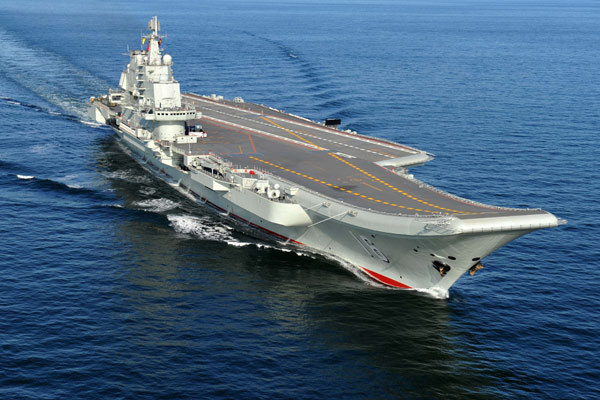Zhao Shengnan shares her experience on aircraft carrier Liaoning ahead of navy's 64th anniversary on April 23.
Zhang Zheng got his first close-up of an aircraft carrier in Portsmouth, England, in 2002.
A decade later, he was named captain of China's first carrier, Liaoning.
"A big country cannot do without aircraft carriers," said Zhang, 44.
"As captain of China's first aircraft carrier, what I care about most is accomplishing our mission and ensuring the safety of the ship," he said.
 |
|
The aircraft carrier has conducted 10 sea trials since August 2011. Photos by Li Tang / for China Daily |
Aircraft carriers have become integral to many navies across the world. Ever since the United Kingdom launched HMS Argus in 1918, these ships have made a huge difference to the military capabilities of the countries that had them.
Apart from China, nine countries operate a combined total of 21 active-service aircraft carriers. Of the five permanent members of the United Nations Security Council, China was the last to build such a vessel.
Although Liaoning has conducted 10 sea trials since August 2011, many experts at home and abroad have said it will take a long time for the Chinese navy, which has lacked working experience of aircraft carriers, to make the ship fully combat-capable. Even a navy as experienced as the United States' usually takes two to three years to achieve that aim.
"China doesn't have to totally follow the regular path that other countries have usually taken," said First Officer Liu Zhigang. "We can refit an aircraft carrier and be fully combat-capable much faster than most experts expected."
Reborn in China
To achieve the dream of owning an aircraft carrier, China brought a half-built, empty hulk from the government of Ukraine in April 1999. The ship, called Varyag, was under construction in the former Soviet Union, but the country collapsed in 1991 before the work could be completed.
Ukraine dismantled the gun turrets and removed the engines before selling the ship to China, which refitted and rebuilt it as the Liaoning.
Lacking a full set of plans and specifications for the ship, those involved in the project were forced to improvise and formulate a "fast, Chinese way" of transforming it into a fully made-in-China product. They succeeded: Tens of thousands of pieces of electronic equipment were installed on the aircraft carrier within around 800 days of her arrival at a shipyard at Dalian Port in the northeastern province of Liaoning in 2005.
When he first saw the vessel, Huang Dongyu, a military representative charged with overseeing the refit, was concerned. "My job focused on enabling the ship to move under its own steam, but I really wasn't sure whether its heart could regain its beat because the whole vessel looked like a huge dump," he recalled.
However, Huang was just one of thousands of workers involved in the production of the Chinese navy's largest vessel to date. Yang Lei, head of the refitting work at the shipyard, said the most difficult part of the project was making every decision concerning the onboard technology. "None of us had ever worked on an aircraft carrier before, and none of us could be called an authority . . . so we just brainstormed, seeking breakthroughs," he said.
For example, almost every aircraft carrier manufacturer has experienced at least one fire. However, in China, the threat of an onboard fire was successfully averted, even though around 5,000 people were working on the vessel at the same time, many using welding equipment and other sources of naked flame.
"We arranged for at least one person with water-spraying equipment to follow every worker using a naked flame aboard the boat, so the threat of fire could be killed at source," said Yang.
Related stories:
From Gangnam to 'Carrier Style'
Female members of Liaoning mark their mark
|
|
|
|
|
|
|
|
